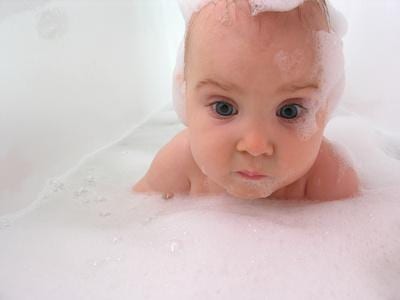Once upon a time, only “crunchy” mommies knew–or cared–about organic baby creams and shampoos. Mothers who espoused ideas like baring baby’s bottom to the air were seen as, at best, a bit eccentric. By 2006, though, the market for organic baby skin care products had grown to $26 million, and organic baby shampoos, diaper creams and lotions moved from health food stores to mainstream supermarkets.
Why Organic Matters
Infants may be more susceptible to smaller amounts of chemical exposure than adults, says the Environmental Working Group, a consumer watchdog agency that commissioned a 2007 study of ingredients used in personal care products for children. The study found that children, including infants, are exposed to an average of 27 chemicals daily that have not been judged safe for use on children.
In addition, many products contain ingredients that contribute to environmental pollution. Certified organic products contain only ingredients and materials that are grown without chemicals that pollute the environment. They’re not only better for your baby’s skin, they offer benefits to all of Mother Earth’s children.
Routine Care
Organic skin care for infants is about more than the products you use on your little one’s skin. It’s based on an understanding that in most cases, less is more. Frequent baths, especially with soap, can dry an infant’s skin. Bathe your baby two to three times a week, advises the University of Maryland Medical Center, echoing a common instruction from pediatricians to new parents. If you avoid stripping the skin’s natural oils, you won’t need to replace them with lotions and moisturizers.
Organic Ingredients
Even on organic products, ingredient labels may be intimidating. Look for products that include both the chemical name and the botanical name in the ingredients listing, as well as those that list organic certification on the label. Common organic ingredients in skin care products for infants include olive, coconut, sweet almond or jojoba oil; rosemary, chamomile, lavender and calendula extracts; and essential oils and extracts of various fruits and berries.
Keep in mind that some babies may be allergic to some ingredients in organic skin care products. Kimberly Rider, author of “Organic Baby: Simple Steps for Healthy Living,” suggests that you choose products with as few ingredients as possible, and always test a new product on a small patch of your baby’s skin before using it all over his body.
Prevention
Laundry detergent, bleach and fabric softener may leave residue on clothing and towels that touch your baby’s skin. Washing diapers and baby clothes in mild laundry soap and running them through a second rinse reduces the chance of an allergic reaction to dyes and fragrances.
Natural fabrics, such as cotton, let skin “breathe” and wick sweat and moisture away from your baby’s body. Remember that babies sunburn far more easily than older children and adults. Use hats and lightweight, long-sleeve outfits to prevent skin damage from the sun and the wind.
Diaper Rash
The Family Doctor website, maintained by the American Academy of Family Physicians, recommends washing the diaper area with plain water at every diaper change and letting your baby go without a diaper as often as possible. Talk to your pediatrician about using baby creams that contain beeswax or organic oils in place of petroleum jelly or zinc oxide ointments to treat mild diaper rash.
Expert Insight
Pediatrician Dr. Mark Diamond told Pittsburgh’s TribLive there’s no proof that conventional baby products harm babies, but that organic products make sense. Organic may not always be better, though, and organic products are usually more expensive. In the end, only you can decide if organic products are worth the additional expense.
Photo Credit
- baby in bath image by Pavel Losevsky from Fotolia.com





